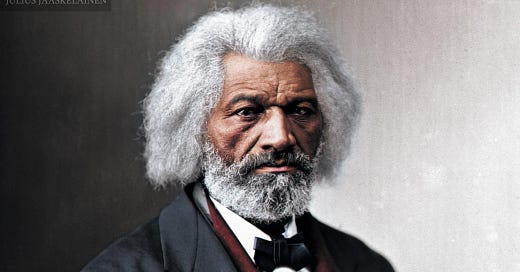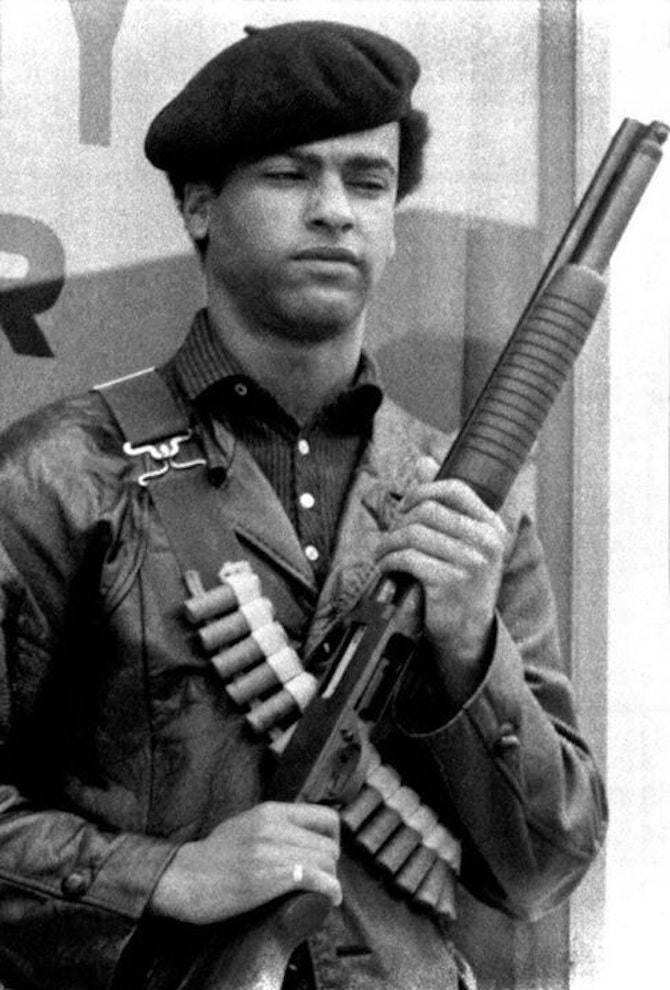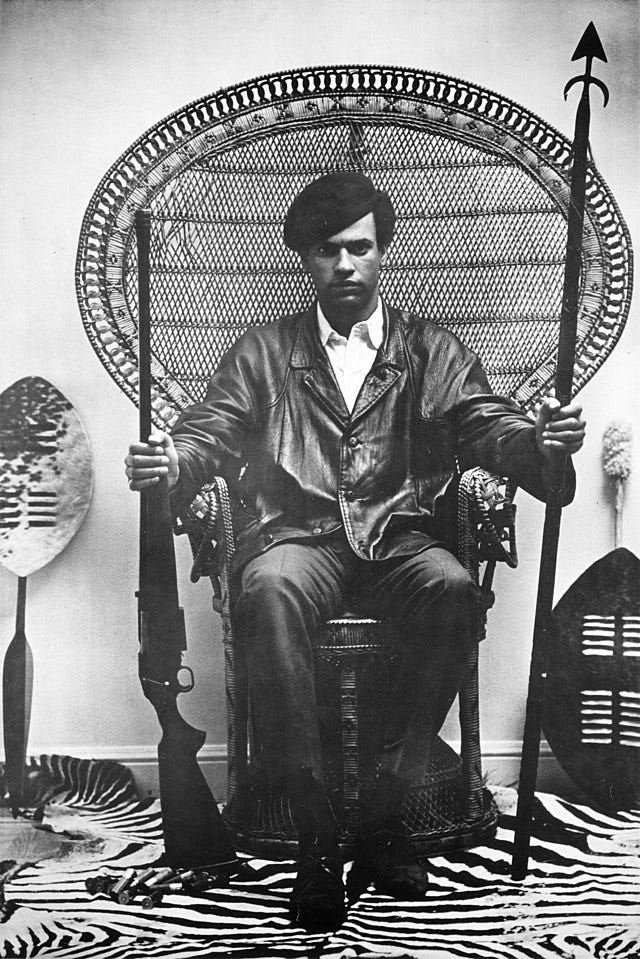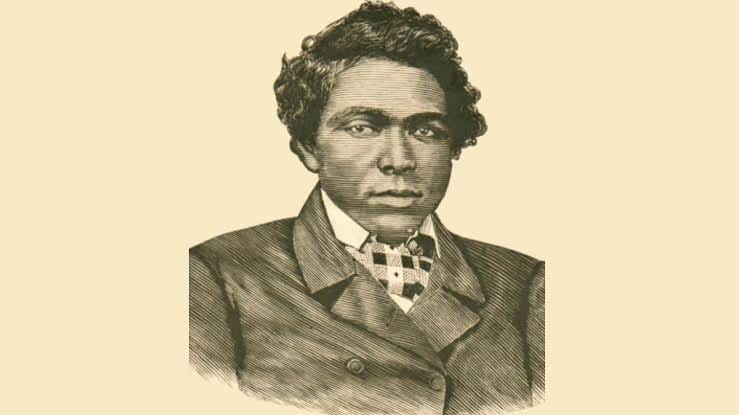One Mic Black History Newsletter
Today we tell the stories of the Birthdays of Frederick Douglass, Huey P. Newton and the Superspy Abraham Galloway
Good Day, Fam, Welcome Back to One Mic History Newsletter. Thank you for joining us today. I appreciate you.
Let’s get started
Happy Birthday Frederick Douglass
February 14, 1818, is the possible birthday of Frederick Douglass. Born into slavery as Frederick Baile, he went on to become one of the greatest abolitionist of his time.
To celebrate his birthday we are going to share a few fun facts about his life.
1. One of the reasons we celebrate Black History Month in February is because of Frederick Douglass. Black Historian Carter G. Woodson founded the precursor to Black History Month, “Negro History Week,” to coincide with the time of year when both Douglass and Abraham Lincoln celebrated their birthdays. He simply was asked the public extend their celebration to the study of black history and not create a new tradition. In this way, he felt this increased the Negro History Week chances for success.
2. Douglass was the most photographed American of the 19th century, sitting for more portraits than even Abraham Lincoln. Douglass intentionally sought out the cameras, believing that photography was an important tool for achieving civil rights because it offered a way to portray African Americans fairly and accurately. He intentionally did not smile for the camera, in part because he wanted to counter “happy slave” caricatures that were common at the time, particularly at places such as minstrel shows where white actors performed racist skits in blackface.
Happy Birthday Huey P. Newton
Born February 17th 1942, he was an Black revolutionary and founder of the Black Panther Party for Self Defense.
In honor of his birthday we are going to share a few facts about the BPP and Huey Newton
1. The Black Panthers consider Malcolm X the progenitor Black Panther. Bobby Seale stated “If they had not murdered Malcolm X, there probably never would have been a Black Panther Party”
2. Huey Newton was named after Louisiana Governor Huey Pierce Long. His father felt that Huey Long had done positive things for black people in Louisiana, so he named him after Long.
3. The BBP took advantage of a California law that allowed people to carry non-concealed weapons, the Panthers instituted armed patrols that monitored police activity in the black community. These patrols led to increasingly tense relations with the police, So the California state legislator passed the Mulford’s Act. which would make the public carrying of loaded firearms illegal in California.
4. Newton was arrested following a shootout that resulted in the death of an Oakland PD officer John Frey in October 1967. In July 1968, Newton was convicted of the lesser charge of voluntary manslaughter. That conviction was overturned on appeal and he was freed in 1970.
5. Early in 1969, The BBP deployed community programs. Soon launched its Breakfast for Children Program in west Oakland. It quickly became a cornerstone of Party's activities nationwide. The Party claimed to have fed twenty thousand children in the 1969 school year. The Panthers free breakfasts shed light on the government’s failure to address childhood poverty and hunger. The US Government spent only $600,000 on breakfast programs in all of 1967 but as the Panthers free breakfast program grew so did Government-sponsored breakfast programs by 1972, government-sponsored breakfast programs were feeding 1.18 million children in the United States.
Have you ever heard of Abraham Galloway?
He was a secret agent for the during the civil war, he escaped enslavement and recruited Black soldiers to fight with the union army. yet though his name has largely been left out of the history books.
Born in Feb. 8, 1837, in a Smithville, NC on the Cape Fear River. He and his mother were enslaved; Abraham worked as a brick mason. At age 20, he escaped to Philadelphia and then Canada by hiding in the hold of a ship carrying barrels of turpentine, tar and rosin. He traveled to Haiti to join revolutionaries planning an attack on the American South that never materialized.
In April 1861, Galloway returned from Haiti and began working as a spy for the Union under Major General Benjamin F. Butler. They were looking for African Americans whom they could recruit as spies. When the Union planned to invade the North Carolina coast, Galloway was the perfect insider to scout the coastline for the best landings because Galloway was born in Smithville. his familiarity with the region, knowledge of the area and his network of local contacts became important resources for the Union Army.
Galloway may have worked for the Union Army, but he didn't trust it. He'd seen racism within its ranks firsthand. In Vicksburg, Miss. in 1862, he was attached to a Union regiment that tried to dig a strategic canal across a bend in the Mississippi River. When Union soldiers began to get sick and die from disease and exhaustion, they enlisted African Americans from nearby plantations. the soldiers promised them protection in exchange for their labor but as many of them also fell ill and died. The ditch was never completed, and the Union Army withdrew, leaving the African Americans behind.
afterwards Galloway appears to have left his role in military intelligence for the Union, and Galloway appears to have shifted his focus to recruiting black soldiers for the Union and working towards the abolition of slavery. During his time as a spy in the Deep South, Galloway was exposed to many different perspectives of life as an enslaved person, and watched the horrors and atrocities they suffered. This experience strengthened his resolve to help enslaved people achieve freedom, abolish slavery, and attain legal equality.
Abraham Galloway didn't stop fighting for civil rights once the Civil War ended. In 1868, he became one of the first African Americans elected to the North Carolina Senate. In the same election Galloway ran for the state senate. The Ku Klux Klan mobilized to keep black men away from the polls, and in response Galloway led an informal black militia. The militia patrolled the streets of Wilmington, armed, and confronted white men suspected of Klan membership. On the night of the election, Galloway led several hundred black men through the streets. The Klan did not appear, and black men were able to vote unimpeded. and Galloway elected to the state senate. White politicians claimed voter fraud.
Galloway died unexpectedly of an illness in September 1, 1870, Some 6,000 people gathered in downtown Wilmington, N.C., to attend his funeral. he was only 33 years old.
Thank you so much for joining us today, I hope you have a wonderful day, If you like stories like this you can find more stories like this at One Mic History.
Thank you and I appreciate your support.
-Countryboi







